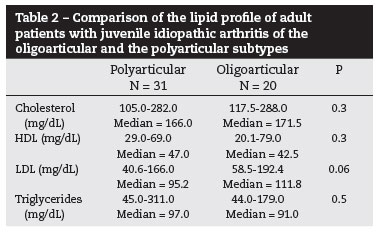The inflammatory processes in the joints of a child with juvenile idiopathic arthritis (JIA) can persist into adulthood. Inflammation has been linked to distortions of the lipid profile and accelerated atherogenesis. In the present study, we examined the lipid profiles of adults with JIA compared with those of healthy people. A lipid profile of a sample of 54 adults with JIA (57.3% with polyarticular JIA, 37.0% with oligoarticular JIA, 1.9% with enthesitis-related JIA and 3.7% with systemic onset JIA) and 54 healthy subjects were compared. In the adults with JIA, data on gender, age, age at disease onset, the presence of rheumatoid factor (RF) and antinuclear antibodies (ANA), a Health Assessment Questionnaire (HAQ) and the disease duration were collected. We found that hypercholesterolaemia, increased low-density lipoprotein (LDL) and decreased high-density lipoprotein (HDL) were more common in patients with JIA than the controls (P = 0.016, P < 0.0001 and P = 0.0008, respectively). Changes in the levels of total cholesterol (TC) and LDL were more common in the individuals who had a later onset of disease (P = 0.0017 for TC and P = 0.023 for LDL). In the entire JIA group, no other variable, such as RF, ANA, disease duration or responses to the HAQ, could be linked to dyslipidaemia (P = non-significant). We concluded that the adult patients with JIA have a lipid profile with increased TC and LDL levels and decreased levels of HDL compared to the controls. No clinical feature could be correlated with this change except for the age at disease onset.
Dyslipidemias; Cholesterol, HDL; Cholesterol, LDL; Triglycerides; Arthritis, juvenile rheumatoid



